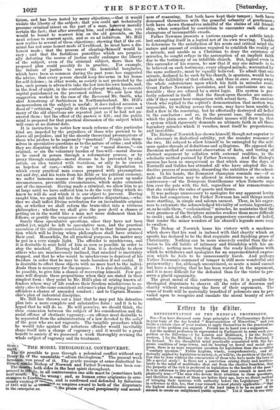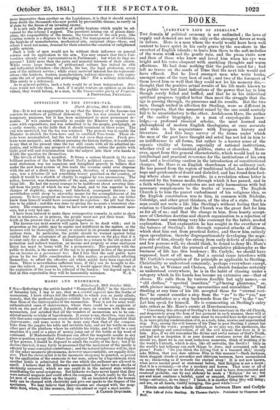Ittftr tu tip ilritar.
REPRESENTITION OF THE 3IEDIC AL PROFESSION.
Sin—You have discussed some large principles of Parliamentary Reform in your topic of the day headed "Representation of Minorities," and you invite a certain class of your readers to apply themselves to the practical so- lution of the problem you suggest. Permit me to hand you a suggestion. Let the medical profession be represented in Parliament in some such pro- portion as the followina.-1 for London and Middlesex, 1 for the South- western, 1 for the Midlind, 2 for the Northern Counties, 2 for Scotland, 2 for Ireland. To the thoughtful mind practically acquainted with the hy- gienic condition of large towns and its bearing on moral and social pro- gress, there is no more important question for legislation than the so-called sanitary question." Public hygiene, wisely, comprehensively, and ef- fectually applied by legislation to society, is or will be, the problem of the day. Can this be done without the concurrence of those who have made the laws of life a special study? Is there not a conviction arising dimly and inarticu- lately in the mind of multitudes shut out from the elective franchise, that the property of the rich is preferred in legislation to the health of the poor? It is in reference to this particular question that your remark is most em- phatically true—"The men who devote their attention to these questions, and therefore in.respect of them are before their age, have no direct method of bringing their opinions with authority. before the Legislature!' It is in reference to this, too, that your remark es most plainly applicable—" that the highest deliberative assembly of the land takes it to be no part of its mission to =ate an enlightened public opinion." let if there be one duty
more imperative than another on the Legislature, it is that it should snatc.h from death the thousands who now perish by preventible disease, as surely as if slain by the forces of an invading enemy. It is not only the great question of public hygiene which might be ad- vanced by the scheme I suggest. The questions arising out of prison disci- pline, the responsibility of the ineane, the treatment of the sick poor, (the existing system is a disgrace to the nation,) the management of workhouses, the hygiene of manufactories, mechanical arts, emigrant ships—these, and others I need not name, demand for their solution the creation of enlightened public opinion.
Such a body of men would not be without their influence on general science and its application to the arts. You may remark that three Uni- eersities already send representatives to Parliament ; but what do they re- present ? Little more than the party and material interests of their clients. While every large branch of professional culture has indeed its able and influential defenders—the church, the bar, the legal profession, every arm of the military service ; while every material interest has its represent- atives—the bankers, traders, manufacturers, railway-directors ; who repre- sents the art of protecting and prolonging life ? Not a solitary individual. This surely is a deficiency.
As to general politic; such a body would be at least independent. Fac- tions would not rule them. And, if I might venture an opinion as an indi- vidual, they would belong, to a man, to the Conservative party of Progress. A Pirovrxersi. YHYSICLA11.



























 Previous page
Previous page